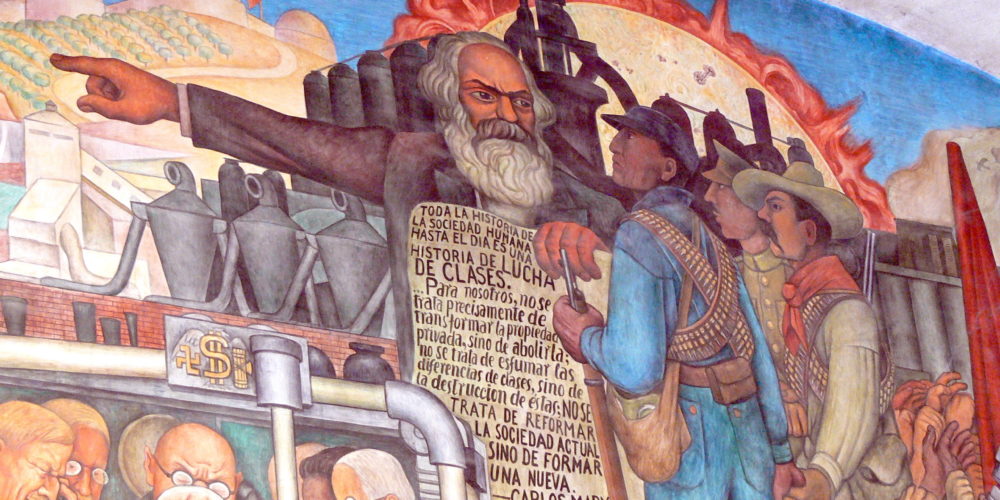The most important task of our class is to shatter the illusion that socialism failed. Socialism, directed by communist and workers’ parties—contrary to what we are all taught and told to believe—did in fact succeed. It worked, and continues to work, very well.
It would be a huge error not to point out the obvious fact that within fifty years of socialist revolution the republics of the Soviet Union went from being backward, semi-feudal peasant societies to some of the most advanced civilisations, with a level and scale of development unprecedented in human history. It guaranteed those most basic human needs that no capitalist country has been able to provide to all its citizens, while also being the first state to launch satellites and send people into space—an extraordinary feat in science and engineering.
The Soviet Union planned and built up its metropolitan cities with some of the most advanced and also affordable public housing schemes, public utilities and transport systems ever built, all with the full participation of all branches of industry, working together with a common goal in an organised, planned way.
Lest we forget, it is vitally important to reiterate the fact that it took capitalism hundreds of years—of genocide, slavery, robbery, organised crime, and every other form of exploitation and extortion of land, labour, and natural resources—to build its metropolitan centres. These cities and states were built on the backs of slaves and of economic migrants from the impoverished and underdeveloped peripheral countries, including Ireland.
To maintain western domination, consumption, and capital accumulation, the capitalist and imperialist powers instigated perpetual war around the globe for the control of the world’s land and resources. The continuation of this is exemplified in Latin America today with coups in Bolivia, Chile, Venezuela, Colombia, and Brazil, countries that, to varying degrees, are under attack or have been taken over by right-wing forces, aided and abetted by the United States and its EU allies.
As the Marxist scholar Michael Parenti succinctly puts it, “the Third World is not poor. You don’t go to poor countries to make money! There are very few poor countries in this world. Most countries are rich! The Philippines are rich! Brazil is rich! Mexico is rich! Chile is rich! Only the people are poor.”
The people are poor because the wealth that is created has been appropriated by capitalists and foreign monopoly capital. Wealth, transferred in its money form, is channelled from the transnational corporations and their local subsidiaries to the banks and offshore accounts of the indigenous capitalists and those in the imperialist centres, who in turn finance the political ruling class to ensure that the policies and laws adopted are framed in their interests. Any objection or opposition is met with deadly and devastating force against those who resist this imperial hegemony.
This is fundamentally how the capitalist system works; and “imperialism” is the word we use to describe this whole process. It is parasitic and, vampire-like, it sucks the blood of every nation that holds the resources it needs to quench the unquenchable thirst for greater profits, greater wealth and capital accumulation, and ultimately greater misery for the majority of the peoples of the world.
Its defining feature is the private ownership of the means of production, i.e. the land, the factories, the mines and mills, infrastructure, and services. Private capital is in the hands of a tiny minority, who make all the major decisions on how they use and abuse the factors of production—land, labour, capital, and enterprise—and who get to keep the spoils, produced by the labouring masses.
Socialism is the antithesis of this primitive and vile anarchic system. It is not reliant on the exploitation and plunder of other nations or its own citizens for its development but in fact is built by the conscious efforts and labour of its citizens, who, through class struggle and education, have become conscious of the class nature of society.
This is why we cannot be taken in by the false promises of social democracy and the different colours of revisionism. For even if a capitalist country succeeds in building a strong social system, with a proper health service, education, housing, etc., it is done with the blood of our brothers and sisters in the underdeveloped world.
Therefore, by definition, in a socialist state industries, utilities, services etc. must be largely indigenous, not being reliant on or held hostage to foreign direct investment. The infrastructure and main means of production are held in common by all citizens, where communication, planning and co-operation between all branches of industry in the economy are directed towards predetermined social goals and plans, which are set by the greatest participation of citizens in a variety of political, industrial and social forums and institutions.
Foreign trade is underpinned by an equivalent of exchange between countries and not by the current trade treaties that favour the developed nations over the underdeveloped, facilitating the continual spread of poverty. At its core, socialism is a system of accumulating social labour to build social capital in order to guarantee the basic human rights of all people.
Under socialism, literally hundreds of millions of people were provided with education, from primary to third level, with medical care and housing, all free of charge or almost so. The people had homes, with homelessness more or less eradicated, thanks to the low-rent housing policies directed towards the building of the housing stock held in public ownership.
Socialist states consistently train and employ more doctors and nurses per capita than capitalist countries and, as in the case of Cuba, have sent their doctors to areas around the globe stricken by disasters. In contrast, the United States sends its military to take advantage of a crisis.
Having these three core needs satisfied has meant that people in socialist states enjoy a healthy life, generally with guaranteed one-month holiday or rest time, and can put people to work in a wide variety of vocations and industries, with guaranteed employment, social security, pensions and social insurance to cover any unforeseen circumstance.
Child care and creches are integrated in work-places to facilitate and promote participation by women in the work force and to change the dynamics and role of men and women in the family and at home. This issue has not been fully resolved but must always be part of the socialist agenda for the further and complete emancipation of women under socialism.
The diet in a socialist state is generally much healthier than in capitalist states. Without having the incentive to lace all foods with addictive sugar and additives in order to sell more and make greater profits, food production can be based more on environmentally sound food-processing.
Culturally, socialism allows for the subsidising of the arts, with free or very cheap access to theatres, cinemas, museums, and art galleries. Sport and cultural infrastructure is heavily invested in to allow people to follow a creative and successful career in sport and the arts. Financial and public support coming from a conscious citizenry dedicated to the betterment and fulfilment of all cultural avenues can be achieved without having private vested interests turning the activity into a sales event. In other words, sport, art and culture can be geared towards the use value of the activity rather than the exchange value.
A socialist system can and does facilitate this because a planned economy, with the conscious participation of an active citizenry, can direct funds to where people see and agree upon the necessity and amounts for funding. Today, trillions lie in the bank vaults of western “democracies,” but they lie idle, earning interest for the tiny minority who have control and ownership of them to buy up more and to further monopolise the world’s economy.
Not only does socialism releases the potential of all this idle money for investment in any and all appropriate sectors of society but the level of accumulation by a tiny minority would not be possible, because the exploitation of one person by another—the source of accumulating wealth under capitalism—would no longer be possible, meaning that a much fairer and equitable distribution of wealth would take its place, and not just on the national scale but at the international level.
As regards democracy, socialism, as understood by the Communist Party, is for deepening and widening the participation of citizens in political life; it doesn’t limit itself to electioneering, or to a secret ballot of elected leaders, and does not give emphasis to competing political parties, which is the extent of capitalist “democracies.” Its goal is to ensure the broadest involvement and participation by different sections of society—industrial, agricultural, cultural, social and other organisations of the people—being represented at all levels of government, so that there is a greater democratic say by all in how the country is run, planned, and managed.
Socialism gives meaning to the word “democracy”: rule by the people. The government of a socialist state, as directed by the maximum participation of its citizens, goes about the task of drafting and then implementing a plan, directed by the people, to meet the needs and wants of its people, using its land, its natural resources and human labour, which is held in common by all for the betterment of all.
When a socialist revolution succeeds in changing the social, political and economic order, it adopts a socialist programme, i.e. the common ownership of the means of production. No two countries will be the same in everything they do, but what they all have in common is that they will be targeted by the imperialist powers, which will do, as they have done, everything in their vast power to undermine the revolutionary socialist country.
So they restrict trade to and from these countries, causing shortages and problems in the economy. This and many other acts of sabotage, as well as espionage. cause distortions in the socialist economy. This is the key to understanding the reality for existing socialist countries in an extremely hostile capitalist world, and is one of the reasons people are so critical and opposed to socialism, but only because they are made conscious of the effects, and not the causes, of the problems.
A vast chasm separates capitalism and socialism. Most people are given a false understanding of what socialism is by those who have either a very clear class interest in maintaining capitalism and so distort the concept of both capitalism and socialism and by those who have no comprehension of the capitalist system yet who feel they have the authority to speak of socialism.
Of course mistakes have been made; but the pioneers of anything will invariably make mistakes. This is all part of the process of creating something new. It is how we learn from the mistakes of the past so as not to repeat them that is the most valuable lesson for future revolutionary movements.
Above all, socialism is the conscious construction of a society where resources are directed to where they are needed, such as in health, education, housing, and the welfare of its citizens, above the private interests of a small minority.
It does this, and has done this, with the support of the class-conscious people, despite the global capitalist aggression, isolation, and falsification of its existence. This is socialism in theory and practice; and if this was taught in schools, from primary to third level, instead of the anti-communist propaganda that is prevalent in western education systems, class-consciousness within the working class would rise, which would of course cause serious concern for the ruling classes.
The reason socialism is treated with such contempt and is criminalised at every opportunity by the western imperialist media and mouthpieces is that they know it is the only system that can threaten the monopoly of the capitalists and imperialism. The success of the capitalist illusion is to convince most people that the victim—socialist countries—are to blame for crimes perpetrated against them by imperialist policies.






